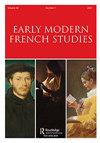The Stage Against the Scaffold: French Adaptations of George Lillo’s London Merchant
IF 0.2
3区 历史学
Q2 HISTORY
引用次数: 0
Abstract
This article considers French theatrical adaptations of George Lillo’s 1731 tragedy, The London Merchant, or, The History of George Barnwell. It asks how authors engaged with concepts of crime and punishment in the process of translation across cultures, genres and theatrical traditions. Following analysis of Lillo’s play, itself adapted from a seventeenth-century ballad, the article focuses on French rewritings of the George Barnwell story in the years following Diderot’s theorization of the drame. I suggest that by the 1760s and 1770s, the more French playwrights attempted to humanize Barnwell’s crime, the harder it became to preserve the meaning of the executions that conclude Lillo’s play. The ways in which the meanings of the scaffold shifted in these theatrical adaptations suggest broader changes in discourses of punishment in 1760s and 1770s France.脚手架上的舞台:法国对乔治·利洛《伦敦商人》的改编
这篇文章考虑了法国戏剧改编自乔治·利洛1731年的悲剧《伦敦商人》或《乔治·巴恩威尔的历史》。它询问作者在跨文化、跨流派和跨戏剧传统的翻译过程中如何处理犯罪和惩罚的概念。在分析了利洛的剧本(改编自17世纪的一首民谣)之后,本文重点关注了在狄德罗的戏剧理论化之后的几年里,法国对乔治·巴恩威尔故事的改写。我认为,到了1760年代和1770年代,法国剧作家越是试图将巴恩韦尔的罪行人性化,就越难保留利洛戏剧结尾的处决的意义。在这些戏剧改编中,脚手架的含义发生了变化,这表明1760年代和1770年代法国的惩罚话语发生了更广泛的变化。
本文章由计算机程序翻译,如有差异,请以英文原文为准。
求助全文
约1分钟内获得全文
求助全文
来源期刊

Early Modern French Studies
Multiple-
CiteScore
0.10
自引率
0.00%
发文量
14
期刊介绍:
Early Modern French Studies (formerly Seventeenth-Century French Studies) publishes high-quality, peer-reviewed, original articles in English and French on a broad range of literary, cultural, methodological, and theoretical topics relating to the study of early modern France. The journal has expanded its historical scope and now covers work on the sixteenth, seventeenth, and eighteenth centuries. Within this period of French literary and cultural history, the journal particularly welcomes work that relates to the term ''early modern'', as well as work that interrogates it. It continues to publish special issues devoted to particular topics (such as the highly successful 2014 special issue on the cultural history of fans) as well as individual submissions.
 求助内容:
求助内容: 应助结果提醒方式:
应助结果提醒方式:


